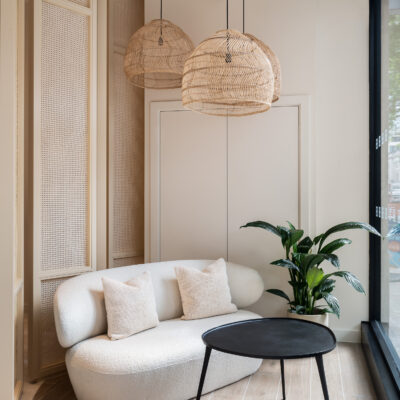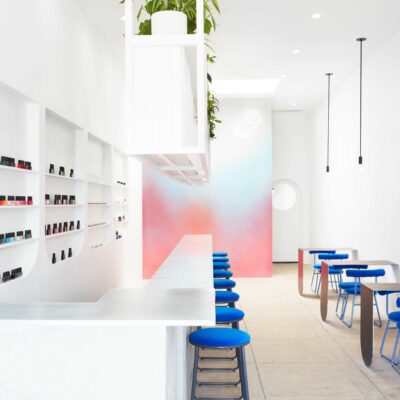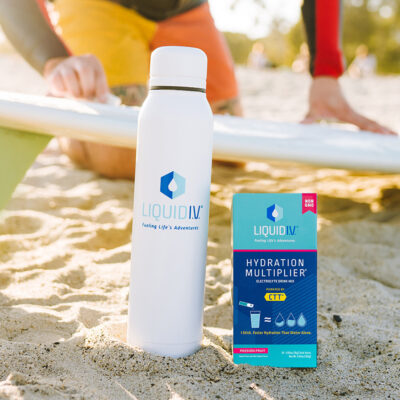
British E-Tailer Skinspace Showcases Indie Skincare Brands For Shoppers On The Hunt For Cool New Products
E-commerce accounts for an estimated nearly 11% of beauty sales in the United Kingdom. Charlie Munton believes it can be much, much larger. He created the e-tailer Skinspace to draw skincare-obsessed shoppers as they migrate their purchases from high street to the information highway.
The website is designed to be a tightly-edited discovery hub that can be easily navigated to drill down on specific products as opposed to the massive beauty selections at the likes of Amazon, Cult Beauty and Feelunique. Its assortment features 30 brands from around the world that are primarily emerging skincare stars, although a smattering of established players with cult followings are in the mix, too.
“What’s happening in skincare is what is happening in lots and lots of industries. People are rejecting the big brands. They may be seen as not cool anymore, and we seeing that in skincare with the rise of indies,” says Munton. “In the U.K., we have Cult Beauty, which sells big mainstream brands and is a huge business, but there didn’t seem to be a site dedicated to new niche brands. Given that it was a great and growing part of the market, it seemed obvious to curate a site dedicated to niche brands.”
In November, Munton started hunting for brands to carry at Skinspace. He outlines performance, price and Instagrammability as important criteria for judging their fit for the site. They have to be shelfie-worthy to be suitable for its target audience of millennial and gen Z consumers. And, for the skincare junkies Skinspance is aimed at, ineffective products just won’t make the cut. Finally, all of the products carried by the site are below 40 pounds or $49 at the current exchange rate and most are below 25 pounds or $31 to encourage impulse purchases.

“You have to be science-led, and you have to work. The products can’t be rubbish. They have to be properly tested, have active ingredients and be decent quality,” says Munton. “That doesn’t mean you have to spend 150 pounds on a small cream. Those days are over. Brands like The Ordinary blew that out of the water.”
Skinspace went live in April and, so far, popular brands in its assortment include Klairs, Benton, Dr Paw Paw, Ho Karan, Gallinée and Madara. The brands Detox Skinfood, Detox Blue Drops, Biod and Koconoi are exclusive to Skinspace in the U.K. Munton is chasing exclusivity to cultivate Skinspace as a destination for merchandise that’s hard to find elsewhere. The site helps exclusive brands overcome European Union certification hurdles and can boost their marketing efforts in the U.K. Skinspace’s marketing is limited to the country at the moment, but it ships worldwide.
Munton asserts the e-tailer’s limited product collection and filtering capabilities distinguish it from competitors. To back up his assertion, he details that LookFantastic has 1,740 stockkeeping units in its moisturizer product category filterable by brand, skin concern, skincare use, price, savings and average reviews. In the same category, Skinspace has 30 products filterable by skin type, skin concern, brand, active ingredients, price, region and ethos. Munton argues enormous quantities of moisturizers end up leaving consumers confused.
“Skincare obsessives are going from niche to mainstream. I see people taking skincare seriously from a young age and continuing to do so.”
“If you use the filters correctly, the whole point is that you are seeing the handful of products that you want to see,” he says, elaborating that the trick to merchandising Skinspace is “offering a nice range, but not being overwhelming. As much as skincare is a fast-growing industry, there is a huge number of people that don’t do as much as they should because it’s overwhelming. We don’t want to worsen the issue of customers being overwhelmed and sell 18 different types of vitamin C products. How on earth do they know which one to buy?” On Skinspace, when shoppers search for a serum by ingredients such as hyaluronic acid, niacinamide or vitamin C, they receive one to three results.
In total, there are now around 250 stockkeeping units available at the site, but Munton anticipates there will be as many as 500 by Christmas. He envisions Skinspace leaping into body care and haircare. SKU-intensive color cosmetics lines would complicate its mission to simplify the shopping process, and it’s staying away from the category for the time being.
Skinspace strives to make skincare shopping stress-free in a fun virtual environment. Munton suggests it’s the opposite of a staid luxury beauty retailer that’s awash in black and white. The digital platform integrates green, orange and lavender to enliven its customers’ experience. “I was seeing all these brands that were colorful, especially at the slightly lower price point. They have crazy colors. They have millennial pink and turquoise,” he says. “Why doesn’t the retailer who is selling them reflect that? We are not ashamed of a bit of color.”

Munton has a strong entrepreneurial streak. Prior to launching Skinspace, he founded cricket bat manufacturer Black Cat of London. Outside of his entrepreneurial endeavors, Munton is a partner at a private investment vehicle not involved in Skinspace that’s seeking to acquire controlling stakes in U.K. companies. Skinspace is self-funded and, at its 12-month mark, Munton says he will assess its customer base and capital needs to determine if he should pursue external investment to support it.
Munton is confident beauty industry dynamics favor Skinspace’s concept. “This could be a big business if we worked hard for five to six years. We could capture people away from where they are currently spending and, as the market grows, we can hoover some of that up as well,” he says, adding, “Skincare obsessives are going from niche to mainstream. I see people taking skincare seriously from a young age and continuing to do so.”





Leave a Reply
You must be logged in to post a comment.